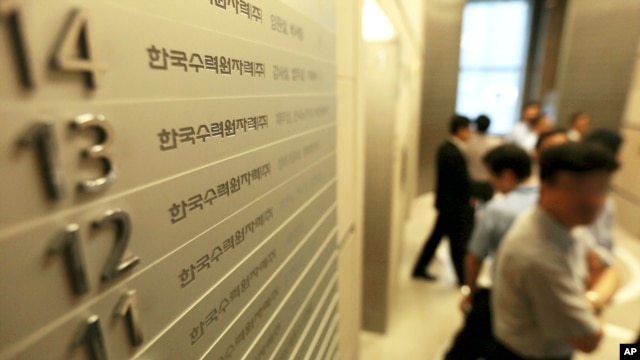
FILE - Employees of Korea Hydro & Nuclear Power Co. walk inside the company's Seoul office after prosecutors seized documents and computer hard drives in South Korea.
SEOUL — South Korea has charged 100 officials and suppliers in its nuclear energy industry with corruption over faked safety certificates for nuclear reactor parts. The scandal, coming on the heels of the Fukushima disaster in Japan, has led to much criticism about how the nuclear industry is regulated.
Public prosecutors in South Korea have indicted at least 100 people after a months-long investigation into bribery in the nuclear power industry.
The scandal - South Korea's biggest in the nuclear industry - involved alleged collusion between parts suppliers and officials at state-run energy companies.
Two senior executives are among those charged: the former CEO at Korea Hydro and Nuclear Power and the vice president of Korea Electric Power Corporation (KEPCO).
A minister in the government office of policy coordination, Kim Dong-yeon, announced the charges Thursday. He said they investigated 10 year's worth of safety certificates for parts at South Korea's 20 operating nuclear reactors.
He said 277 of those documents were found to be forged, and 7,733 parts relevant to the documents have been replaced. He said necessary measures including safety reassessment have been completed for some of the parts.
A nearly completed investigation of three offline reactors and five currently under construction found more than 2,000 forged safety certificates. Authorities say almost all those parts have been replaced.
The probe also discovered South Korea's nuclear reactors had to be quickly shut down 128 times in the last decade because of faulty parts. It was not made clear if those parts were ones with fake safety certificates.
Suh Kune-yull, a professor at the department of nuclear engineering at Seoul National University, said the scale of the scandal is shocking.
But what is important, he said, is whether it is directly related to the safety of nuclear reactors or would cause an accident during operation. He said they are not related to such concerns, as faulty parts could only be a problem if there was an accident. However, "we cannot be relaxed," he said.
Analysts and officials say a culture of corruption was created as former nuclear regulatory and industry officials were allowed to swap jobs.
After the scandal broke last year, the government banned retirees of public enterprises from being re-hired by cooperative firms.
But Suh said that close relationship still poses a threat.
He said this pattern must be broken, but a shadow of it still remains. He said they could experience a disaster similar to Fukushima one day if the shadow is not removed completely.
Japan's Fukushima Daiichi nuclear power plant failed to withstand a 2011 earthquake and tsunami, resulting in meltdowns officials there are still struggling to contain.
Critics partly blame poor planning at Fukushima on the old ties in Japan's nuclear industry.
South Korean minister Kim said they are still investigating a further 21 former and current officials related to nuclear reactor corruption.
He said they hope the so-called nuclear mafia style behavior would be rooted out if strict investigations, law enforcement, and system improvements to prevent corruption continue.
South Korea's 23 nuclear power reactors supply about a third of the natural resource-poor country's electricity. But, Asia's fourth largest economy has battled to keep up with its growing demand for power.
The Fukushima disaster had already dropped support for nuclear power, and South Korea's own nuclear scandal is raising further questions.
But concerns about safety have not ruffled authorities in Seoul, who still plan to build another 16 nuclear reactors by the year 2030.
The widening corruption case has also embarrassed South Korea's efforts to expand its nuclear power business overseas.
Seoul won a $20 billion contract in 2009 to supply four reactors to the United Arab Emirates. |
|
